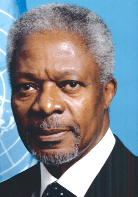REASSEMBLING BROKEN DREAMS
On Tuesday, January 23rd, the former UN General Secretary was welcomed by hundreds of Ghanaians, including President Kufor who insisted that he be the first to greet him. The landing was televised nationally. Throughout the countries major cities, billboards with the background of the flags of
Within 48 hours of his arrival home, Kofi Annan was to offer a lecture as the kick-off to a series that would take place throughout 2007, the 50th anniversary of
The speech, focusing on the subjects of peace, development, and human rights was given before an auditorium of 1500 invitees, as well as being broadcast live across the country.
With a calm elegance, and tinges of what seem to be an introverted personality, Kofi Annan moved through his viewpoint of the continent from the initial wave that brought on the independence movement and Pan-Africanist ideals, to a well selected list of facts and figures presenting the challenges and potential for Africa in an optimistic light.
He described the aura of possibility that lit
As he connected figures such as a 5000 percent growth in cell usage in Africa, the reliance in imports placing the continent as the only region on the planet unable to feed itself, the effect of the arbitrary marking of national borders, and the movement to ostracize leaders and states that seized power through military means, he provided a portrait of Africa as he sees it, and the Africa that he is now returning to.
Of particular interest was his insistence that many African countries are on target to meet many of the Millenium Development goals set by the United Nations to reduce such issues as HIV/AIDS, mother/infant mortality, and extreme poverty globally. His review was boldly in contrast with the assessment offered by most stakeholders, whose voice is well represented in Stephen Lewis’ book, Race Against Time.
While introducing the invited speaker, Professor Daniel Adzei-Bekoe moved through a chronology of Kofi Annan’s experiences and accolades. He detailed his birth just outside of
The evening was focused on his Nobel Peace Prize for “increasing peace on the planet”, his raising the profile of the United Nations, his role in the attention being paid to the HIV/AIDS epidemic, and the extension of a second term, which actually required a bending of the rules as testament to the magnitude of his impact at the helm of the UN. However, critics of Kofi Annan have two major charges against him: twice failing to act in the face of genocide and facilitating corruption and abuse of office.
In the upper-echelon posts held prior to his appointment as General Secretary, his office stopped UN forces from intervening in clear threats to citizens in
Responding to a request to take action by Canadian ex-General Roméo Dallaire who was in
In retrospect, he has said, “I believed at that time I was doing my best. But I realised after the genocide there was more I could have and should have done to sound the alarm and rally support”.
As for the second charge, the list includes sexual assault accusations against a senior UN official in the Congo who was found guilty through proceedings and then cleared by Annan, a large contract being awarded to a company that his son was a partner with (though Annan publicly condemned his son for not being honest about his relationship with the company), and a cobweb of controversy yet to be fully unveiled that saw Sadam Hussein pocket an estimated 21 Billion dollars through what has been called the Oil-For-Food ‘Scandal’, rather than ‘Programme’.
Facing his own past he offers, "I admit that I have made mistakes, maybe, in retrospect, some of the people who were put in certain positions were not ideally suited."
In his final year of office he was unable to stop a ‘war’ in Iraq that he called “illegal” and watched it spiral into planet’s most turbulent warzone, he a siege on southern Lebannon by Israel that he sought to stop for almost forty days which decimated that section of the country and included a bombing on a building declared a UN safety zone, and the continuation of a genocide in Sudan that the globe continues to observe out of respect for Sudan’s “national sovereignty”.
With the facts on the table, one needs to consider the magnitude of the responsibility placed on the shoulders of the UN General Secretary – a burden of expectation dramatically pronounced in the case of Kofi Annan. He was placed at the helm of the global body of the UN in an age ‘of wars and rumors of wars’. His accomplishments have been celebrated, while his mistakes in some cases are clear, and in other cases his innocence is uncertain. Yet, demanding that one makes all of the right decisions in an organization of that magnitude, on the complex home that is our globe seems a bit absurd.
Kofi Annan is not a villain; he also may not be a saint. He was hired, heralded and condemned for his skill at finding compromise. A portion of the criticism is also more telling of the flaws in the UN system, than of a lack of will or awareness on his part.
In his exit speech given on December 11th, 2006, Kofi Annan listed the five lessons that he learned while in his position, all of which pointed to the necessity of breaking down borders and gaps separating the people of the globe. In that same speech, he also pointed out the major limiting factor of his career, when he chided the member states of the UN Security Council irrefutably stating, "the responsibility of the great states is to serve and not dominate the peoples of the world".

1 comment:
I like your blog. Keep writing!
Post a Comment